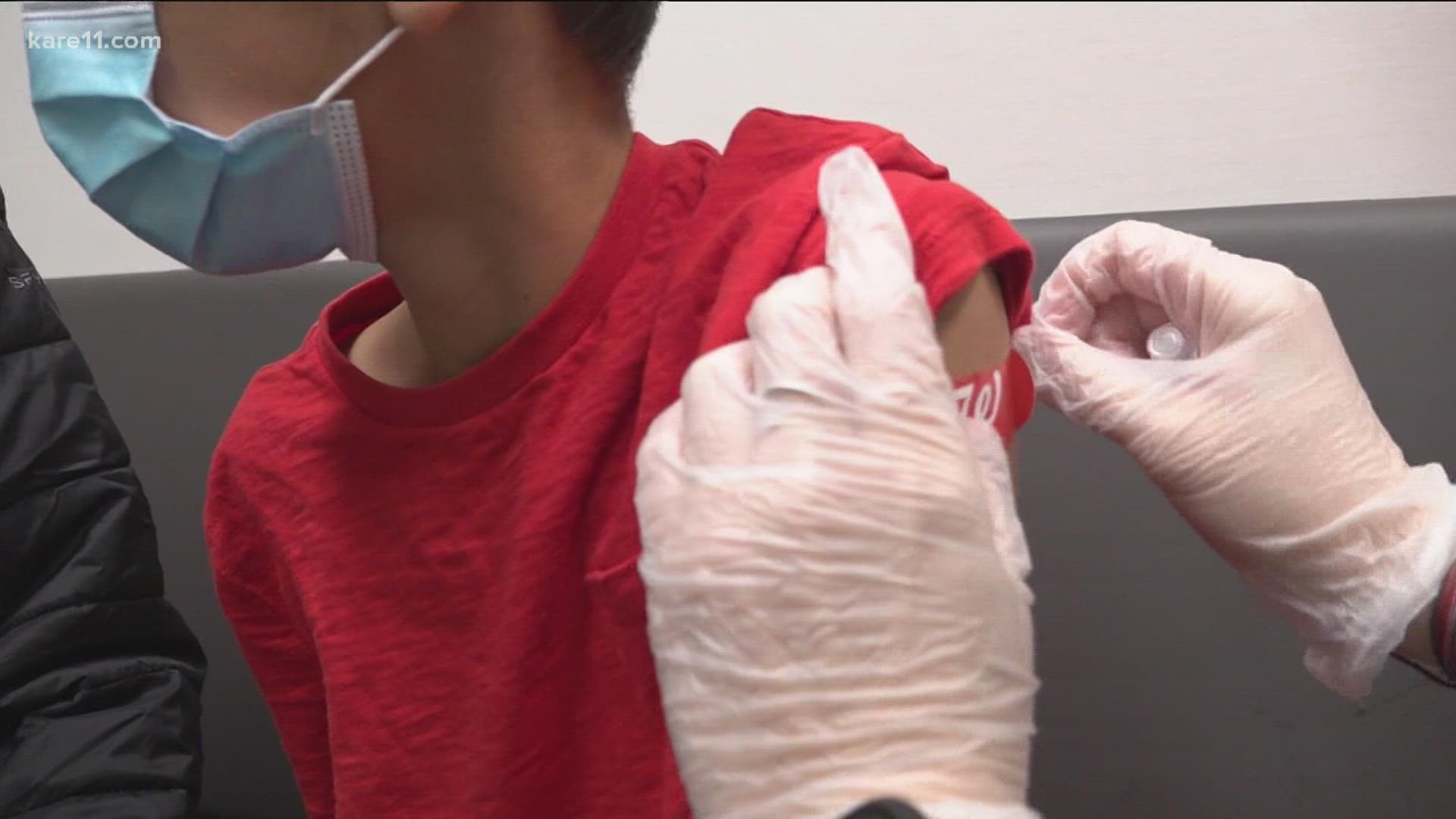MINNEAPOLIS — Vaccinations for kids ages 5 to 11 have been underway for about a week now.
Based on the numbers, it's already clear that parents are taking advantage of the new eligibility for their younger children.
So far, in Minnesota, more than 18,000 kids in this age group have received their first dose of the Pfizer shot, according to state data. Nationwide, that number is pushing one million.
The early rush is a positive sign for doctors like Dr. Krishnan Subrahmanian, a Hennepin Healthcare pediatrician who views the vaccination effort for 5- to 11-year-olds as a key step toward cutting overall community transmission. An estimated 28 million children nationwide fall into this age range.
"There's a lot of demand and a lot of excitement around the vaccine. We're seeing it in our clinics and seeing families ask for it," Subrahmanian said. "Busy – but positive – is how I would describe the last few days."
According to a spokesperson for the Minnesota Department of Health, the federal government has allocated an initial 217,271 Pfizer doses to the state for 5- to 11-year-olds, with slightly more than 101,000 delivered to hospitals, health care providers and pediatricians.
However, that is still a finite number, and local doctor's offices only have so much supply and so many appointment slots. Dr. Andrea Singh, the chairperson of pediatrics at Park Nicollet clinics, said her team is working to offer appointments before school, after school and even on weekends.
"It has been a little challenging in terms of navigating the demand," Singh said. "But it's an exciting challenge."
As doctors scramble to distribute the COVID-19 vaccine to younger kids, staffing shortages remain a major issue. The health care industry has been decimated by the pandemic, forcing medical professionals to take on more responsibilites with fewer resources.
"We've had to figure out how to help with our staffing. That has really been the great limiting step right now," Singh said. "The whole world is short-staffed, and we're facing a little bit of that, but we're doing our very best to accommodate the times when families need."
Dr. Sally Goza, the immediate past president of the American Academy of Pediatrics, said pediatricians in almost every state have reported similar issues.
"I think offices across this country are short-staffed. A lot of people have left health care during this crisis, during this pandemic, for various reasons," Goza said. "And so, it's hard to find staff. It's hard to keep staff."
Besides administering vaccines for 5- to 11-year-olds, pediatricians' offices are also still handling COVID-19 vaccinations for older kids, not to mention flu vaccines. And, those general day-to-day duties – like regular check-ups and sick visits – are still there, too.
"We can't build more time into a day or bring in more staff just at the snap of our fingers. It's challenging," Goza said. "But, pediatricians, we are going to do it. Because we know this is these kids' shot. This is their kids' chance to get vaccinated and protect them from this disease."
If vaccine slots fill up at their pediatrician's office, parents still have other options.
"I think the best thing for parents to do is to look broadly," said Dr. Hannah Lichtsinn, an internist, pediatrician, and board member for the Minnesota Chapter of the American Academy of Pediatrics. "Start with your family's clinic, pediatrics clinic, or family medicine to see what they're offering and what the availability is like there. Also, look at local pharmacies. The large pharmacy chains are doing vaccinations, and the health department has a large vaccine site at Mall of America, taking appointments for kids 5 to 11."
After that, Lichtsinn suggested, parents can look to their schools. Many districts have already been offering those vaccine events and will have more in the coming weeks.
The state of Minnesota also has a website devoted to helping parents find vaccine slots for their kids.
"It's a sign of optimism. A sign of hope," Dr. Krishnan Subrahmanian said. "Once we can get young people vaccinated, and let schools and community gatherings of children be safe spaces, that's a really powerful thing."

